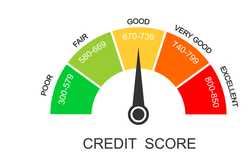What Is the FICO Score 8?

Our evaluations and opinions are not influenced by our advertising relationships, but we may earn a commission from our partners’ links. This content is created by TIME Stamped, under TIME’s direction and produced in accordance with TIME’s editorial guidelines and overseen by TIME’s editorial staff. Learn more about it.
You probably know by now that people actually have multiple credit scores instead of just one. This is not only due to the different credit scoring models that exist; it's also because the three credit reporting agencies assign scores of their own. Break it down even further and you'll find there are multiple scores at work within the main scoring models—FICO and VantageScore—with one of the most popular being the FICO Score 8 credit score.
The Fair Isaac Corporation (FICO) says that FICO Score 8 is one of the most widely used versions, even though it's not the newest. If you're curious how FICO Score 8 works and why it matters, read on to find out everything you need to know.
While FICO Score 8 is one of the most popular types of credit scores used by lenders for the purpose of making credit decisions, you may have also encountered a very similar-sounding term—FICO Bankcard Score 8.
Generally speaking, FICO Bankcard Score 8 is the version of FICO Score 8 used in credit card decision-making. This means that, when you apply for a new credit card, there's a good chance the card issuer will see a FICO Bankcard Score 8 version of your score.
Note that, unlike traditional FICO scores that fall within a scale of 300 and 850, FICO BankcardScore 8 credit scores fall between 250 and 900.
The FICO Score 8 comes about after FICO considers a range of factors relating to your creditworthiness and overall debt. Each of the credit bureaus—Experian, Equifax, and TransUnion—can give you its own credit score based on the unique information that may be different across each of your credit reports. FICO also says credit scores can be different even when the exact same information is listed in each bureau's credit reports since "each of the bureau's FICO scoring system was designed to optimize the predictive value of their unique data."
In any case, FICO Score 8 offers scores between 300 and 850 and bases your credit score on five important factors that provide a picture of your creditworthiness:
FICO Score 8 credit scores are just as important as other credit scores you have, and maybe even more important since they're so widely used. The fact is, having a good FICO score (670 or higher) can unlock financial options you might not otherwise have, whereas having fair credit (FICO scores from 580 to 669) or poor credit (scores below 580) can make your financial life harder in multiple ways.
Some of the reasons FICO credit scores matter include:
RELATED: 760 Credit Score: Is it Good or Bad?
RELATED: 680 Credit Score: Is it Good or Bad?
Each new FICO credit score tries to improve upon credit scoring methods while making processes much more fair and equitable for consumers. With that in mind, here are some of the changes that came about with FICO Score 8, compared to previous scoring models:
FICO Score 8 is widely used, but there’s also Version 9, which was introduced in 2014. Here's an overview of the biggest changes that came out with FICO Score 9, according to FICO itself:
Version 9 is just one of the many types of FICO scores lenders may use. While you don't get to pick which score is employed when you apply for a loan or fill out an application for an apartment, other types of credit scores to know about include:
| FICO credit scores | Used for |
|---|---|
FICO Score 9 | Most widely used (along with FICO Score 8) |
FICO Auto Score 9/8/8/4/2 | Auto lending |
FICO Bankcard Score 9/8/5/2; FICO Score 3 | Credit card decision-making |
FICO Score 5/4/2 | Mortgage lending |
FICO Score 10; FICO Auto Score 10; FICO Bankcard Score 10; FICO Score 10T | Newly released FICO scores |
VantageScores are also used in decision-making for credit cards, auto loans, banking, and more. VantageScore types that can work as alternatives to FICO Score 8 include VantageScore 1.0, VantageScore 2.0, VantageScore 3.0, and VantageScore 4.0.
Your FICO Score 8 is just one measure of your overall credit health, although it may be one of the most widely used scores overall. Even so, the steps to improve your credit are mostly the same regardless of the credit score being used.
Pay all your bills early or on time with no exceptions, keep debt levels at a minimum, don't open too many accounts at once, and refrain from closing old accounts if you don't have to. Rinse and repeat, and your credit score will eventually take care of itself.
FICO Score 8 is a type of credit score, but your score will never be 8 because this scoring model assigns scores between 300 and 850.
FICO Score 8 is a type of FICO score that is one of the most commonly used.
Most lenders want to see a credit score of at least 620 when applicants apply for a conventional mortgage. However, mortgage lenders are most likely to use one of the FICO scoring models used for their industry when you apply, including FICO Score 2, FICO Score 5, or FICO Score 4.
FICO Score 9 is slightly more forgiving than FICO Score 8 since paid-off debt in collections no longer factor in, medical debts are treated differently, and consumers get more help with their credit when their rent payments are reported to the credit bureaus.
The information presented here is created by TIME Stamped and overseen by TIME editorial staff. To learn more, see our About Us page.




